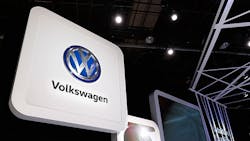Volkswagen AG’s supervisory board is set to sign off on a $4.3 billion settlement of U.S. criminal and civil penalties for rigging diesel-powered cars to cheat on emissions tests, the latest step in the carmaker’s effort to resolve the scandal.
The agreement with the U.S. Department of Justice and customs authorities will include a guilty plea, VW said. The board plans to meet today to review the agreement.
The accord raises the cost of settlements in the scandal so far to more than $23 billion in the U.S. and Canada, blowing through the 18.2 billion euros ($19.08 billion) the carmaker had set aside to resolve the disputes. At the same time, it would remove one of the last big regulatory obstacles for Volkswagen before the Jan. 20 inauguration of Donald Trump as U.S. president, enabling the carmaker to begin rebuilding its reputation in the country and focus on plans for clean-energy vehicles.
“Although the settlement is higher than reports had indicated, we view the resolution as a positive catalyst for Volkswagen since it removes the final known major liability” from the diesel scandal, even with other legal issues pending, analysts at Goldman Sachs said in a report to clients.
U.S. courts must still approve the settlement. VW also is involved in investor lawsuits in the U.S. and in Germany related to how the emissions-test rigging affected the stock price, as well as consumer lawsuits and a criminal probe in Germany.
Concluding those disputes will be important as CEO Matthias Mueller seeks financial resources to shift the carmaker — which almost certainly overtook Toyota Motor Corp as the world’s biggest last year — to new technology including electric powering systems and automated driving. That strategy will cost more than 10 billion euros ($10.48 billion) in investments by 2025, the company said in June.
Volkswagen shares rose 2% to 149.20 euros ($156.41) at 09:25 a.m. in Frankfurt trading, narrowing the loss since the scandal broke in September 2015 to about 8%.
At least one employee is facing charges in the U.S. and another has already pleaded guilty related to the scheme. U.S. prosecutors are planning to charge high-level VW executives based in Germany, a person familiar with the matter said.
The draft settlement calls for strengthening compliance systems and installing an independent monitor for three years, Volkswagen said in the statement. The company didn’t say in its statement whether additional individuals would be charged or plead guilty. The Justice Department declined to comment.
U.S. authorities uncovered the carmaker’s efforts to deliberately cheat on emissions tests on diesel vehicles in 2015. The rigged engines had been installed in 11 million vehicles worldwide, and cost former CEO Martin Winterkorn his job.
The carmaker, which plans to post a provision in the fourth quarter of 2016, has the resources to absorb the costs. The company had net liquidity of 31.1 billion euros ($32.60 billion) in the automotive division at the end of the third quarter, and extended a 20 billion-euro ($20.97 billion) bridge loan facility through mid-2017 to provide an additional financial cushion and protect its credit rating.
Volkswagen’s 2016 financial performance will be hurt by the settlement, Porsche Automobil Holding SE, the investment vehicle of the Porsche and Piech billionaire families that controls 52% of VW’s voting stock, said in a statement on Tuesday.
VW engineer James Liang pleaded guilty in September in U.S. federal court in Detroit to conspiring to defraud U.S. regulators and consumers. Liang, who was involved in creating a defeat device so cars with 2.0-liter diesel engine could pass emissions tests, is scheduled to be sentenced May 3 and faces as long as five years in prison. He’s cooperating with prosecutors.
Oliver Schmidt, the company’s liaison with U.S. environmental regulators, was arrested Saturday in Florida and is scheduled to appear in court there again Thursday.
By Margaret Cronin Fisk, Tommaso Ebhardt and Christoph Rauwald, with assistance from Tom Schoenberg and Kartikay Mehrotra.
About the Author
Bloomberg
Licensed content from Bloomberg, copyright 2016.
